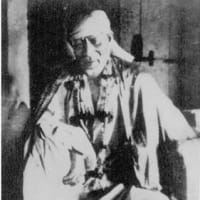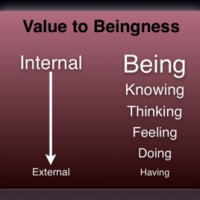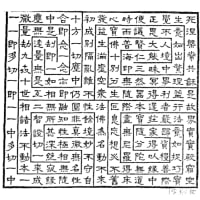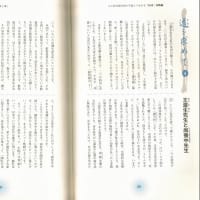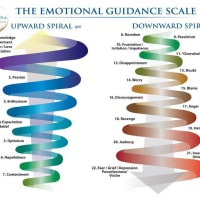Bernadette Roberts (バーナデット・ロバーツ) 1931~ (06 - 3 - 2)
Awakening to Reality: Bernadette Roberts Interview
現実に起きること:
バーナデット・ロバーツ・インタビュー
Bernadette Roberts Interview
Posted by: Wei Yu
Jul 04 2007
前の内容:
Bernadette Roberts (バーナデット・ロバーツ) 1931~ (06 - 1)
2013-06-12 20:51:35 | 話題 (opinion)
Bernadette Roberts (バーナデット・ロバーツ) 1931~ (06 - 2)
2013-06-12 21:41:44 | 話題 (opinion)
Bernadette Roberts (バーナデット・ロバーツ) 1931~ (06 - 3 - 1)
2013-06-12 21:47:44 | 話題 (opinion)
Stephan: How did you discover the further stage, which you call the experience of no-self?
ステファン:どのように一層の段階(それを無自己の経験と呼ぶ)を発見しましたか。?
Bernadette: That occurred unexpectedly some 25 years after the transforming process. The divine center - the coin, or "true self" - suddenly disappeared, and without center or circumference there is no self, and no divine. Our subjective life of experience is over - the passage is finished. I had never heard of such a possibility or happening. Obviously there is far more to the elusive experience we call self than just the ego. The paradox of our passage is that we really do not know what self or consciousness is, so long as we are living it, or are it. The true nature of self can only be fully disclosed when it is gone, when there is no self.
バーナデット:それが、変換プロセスの約25年後に、予想外に起こりました。神センター - コイン、あるいは "本当の自分"は - 突然消えておらず、センターまたは円周なしでは自己は存在しない、とない神。経験の私達の主観的な生活は終わった - 通路が仕上がっています。私はそのような可能性や出来事のことを聞いたことがなかった。明らかに我々がちょうど自我も自己呼び出しとらえどころのない経験にはるかがあります。私たちの通路のパラドックスは、我々が本当に何か自己意識がある限り、我々はそれを生きているように、であるか、またはそれであるかわからないということです。それがなくなったときに、自己が存在しない場合は自己の本質は、完全に、開示することができます。
One outcome, then, of the no-self experience is the disclosure of the true nature of self or consciousness. As it turns out, self is the entire system of consciousness, from the unconscious to God-consciousness, the entire dimension of human knowledge and feeling-experience. Because the terms "self" and "consciousness" express the same experiences (nothing can be said of one that cannot be said of the other), they are only definable in the terms of "experience". Every other definition is conjecture and speculation. No-self, then, means no-consciousness. If this is shocking to some people, it is only because they do not know the true nature of consciousness. Sometimes we get so caught up in the content of consciousness, we forget that consciousness is also a somatic function of the physical body, and, like every such function, it is not eternal. Perhaps we would do better searching for the divine in our bodies than amid the content and experience of consciousness.
一つの結果は、その後、無自己経験の自己意識の本質の開示である。結局のところ、自己は無意識から神の意識、人間の知識と感情体験の全体の寸法に、意識の全体のシステムです。用語は、 "自己"と "意識"が同じ経験(何も他に言うことができない1の言うことができない)を発現するので、彼らは "経験"の観点でのみ定義可能です。他のすべての定義は、推測や憶測である。無自己、その後、無意識しないことを意味します。これは一部の人々に衝撃的である場合、彼らは意識の本質を知らないので、それだけです。時には、我々はそう意識の内容に巻き込ま、私たちは、その意識はまた身体の体関数であり、かつ、すべてのそのような機能のように、それが永遠ではないことを忘れない。おそらく、我々は意識の内容や経験の中でも、私たちの体で神のためのより良い検索を行うだろう。
Stephan: How does one move from "transforming union" to the experience of no-self? What is the path like?
ステファン:1つは、どのように「結合を変形する」ことから無自己の経験まで移りますか?パスはどのようなものですか?
Bernadette: We can only see a path in retrospect. Once we come to the state of oneness, we can go no further with the inward journey. The divine center is the innermost "point", beyond which we cannot go at this time. Having reached this point, the movement of our journey turns around and begins to move outward - the center is expanding outward. To see how this works, imagine self, or consciousness, as a circular piece of paper. The initial center is the ego, the particular energy we call "will" or volitional faculty, which can either be turned outward, toward itself, or inward, toward the divine ground, which underlies the center of the paper. When, from our side of consciousness, we can do no more to reach this ground, the divine takes the initiative and breaks through the center, shattering the ego like an arrow shot through the center of being. The result is a dark hole in ourselves and the feeling of terrible void and emptiness. This breakthrough demands a restructuring or change of consciousness, and this change is the true nature of the transforming process. Although this transformation culminates in true human maturity, it is not man's final state. The whole purpose of oneness is to move us on to a more final state.
バーナデット:我々は、振り返ってみるとパスをのみ見ることができます。我々は、ワンネスの状態に来たら、私たちは内側の旅で、それ以上行くことができません。神の中心は、我々はこの時点で行くことができないそれを超える最も内側の"ポイント"です。この点に到達した、私たちの旅の動きは周りになり、外側に移動することから始まります - 中心が外側に拡大しています。この作品は、紙の円形の作品として、自己、または意識を想像する方法を確認する。初期センターは自我、我々は"意志"どちらか紙の中央を根底に神の地面に向かって、内側自体に向かって、外向きになったり、することができます意志教職員、呼び出す特定のエネルギーである。意識の我々の側から、我々はこの地に到達することなくより多くのことを行うことができないときは、神があることの中心を通って撮影した矢印のような自我を粉砕、中心を通ってイニシアチブと休憩をとります。結果は自分自身で暗い穴と恐ろしい無効と空虚感です。この画期的な、意識の再編または変更を要求し、この変化は変換プロセスの本質である。この変換は、真の人間の成熟度で最高潮に達していますが、それは人間の最終的な状態ではありません。ワンネスの全体の目的は、より多くの最終状態へと私たちを移動することです。
To understand what happens next, we have to keep cutting larger holes in the paper, expanding the center until only the barest rim or circumference remains. One more expansion of the divine center, and the boundaries of consciousness or self fall away. From this illustration we can see how the ultimate fulfillment of consciousness, or self, is no-consciousness, or no-self. The path from oneness to no-oneness is an egoless one and is therefore devoid of ego-satisfaction. Despite the unchanging center of peace and joy, the events of life may not be peaceful or joyful at all. With no ego-gratification at the center and no divine joy on the surface, this part of the journey is not easy. Heroic acts of selflessness are required to come to the end of self, acts comparable to cutting ever-larger holes in the paper - acts, that is, that bring no return to the self whatsoever.
次に何が起こるかを理解するために、我々はbarestリムまたは周囲だけが残るまで、センターを拡大し、紙に大きな穴を切断維持する必要があります。もう一つの神の中心の拡大、意識や自己の境界が離れて落ちる。この図から、我々は意識、または自己の究極の履行が無意識、またはノーショー自己ではないかを見ることができます。ワンネスからノーワンネスへのパスはegoless一つであり、それゆえ自我満足を欠いている。全然平和と喜びの不変の中心にもかかわらず、人生の出来事は、平和的な、または楽しいではありません。表面上の中心となし神喜びでない自我満足で、旅のこの部分は簡単ではありません。行為、全く自己にノーリターンをもたらしていないこと、である - 無私の英雄的行為が自己の最後に来るように要求される、紙でかつてない大きな穴を切断に匹敵する役割を果たします。
The major temptation to be overcome in this period is the temptation to fall for one of the subtle but powerful archetypes of the collective consciousness. As I see it, in the transforming process we only come to terms with the archetypes of the personal unconscious; the archetypes of the collective consciousness are reserved for individuals in the state of oneness, because those archetypes are powers or energies of that state. Jung felt that these archetypes were unlimited; but in fact, there is only one true archetype, and that archtype is self. What is unlimited are the various masks or roles self is tempted to play in the state of oneness - savior, prophet, healer, martyr, Mother Earth, you name it. They are all temptations to seize power for ourselves, to think ourselves to be whatever the mask or role may be. In the state of oneness, both Christ and Buddha were tempted in this manner, but they held to the "ground" that they knew to be devoid of all such energies. This ground is a "stillpoint", not a moving energy-point. Unmasking these energies, seeing them as ruses of the self, is the particular task to be accomplished or hurdle to be overcome in the state of oneness.
We cannot come to the ending of self until we have finally seen through these archetypes and can no longer be moved by any of them.
So the path from oneness to no-oneness is a life that is choicelessly devoid of ego-satisfaction; a life of unmasking the energies of self and all the divine roles it is tempted to play.
It is hard to call this life a "path", yet it is the only way to get to the end of our journey.
この時期に克服すべき主要な誘惑が集合意識の微妙だが強力なアーキタイプのいずれかに対して下落する誘惑です。私はそれを見るように、変換過程で我々は個人的な無意識の原型との折り合いをつける、それらの原型は、その国家の力やエネルギーがあるので、集合意識の原型は、一体の状態で個人のために予約されています。ユングは、これらの原型が無制限であることを感じました、しかし実際には、そこに唯一の真の原型であり、そのarchtypeが自己である。無制限、自己がワンネスの状態でプレーするように誘惑されて、様々なマスクや役割は何ですかさ - 救世主、預言者、ヒーラー、殉教者、母なる地球は、あなたはそれに名前を付けます。彼らは自分がマスクや役割が何であれことを考えて、自分のために権力を掌握するために、すべての誘惑である。ワンネスの状態では、キリストや仏陀の両方が、このように誘惑されたが、彼らはこのようなすべてのエネルギーを欠いていることを知っていた"地面"を開催しました。このグランドは、"静止点"ではなく動くエネルギーポイントです。 、、これらのエネルギーをアンマスク自己の策略としてそれらを見ることはワンネスの状態で克服しなければ達成またはハードルべき特定のタスクです。我々は最終的にこれらのアーキタイプを通して見ていると、もはやそれらのいずれかで移動することができないまで、我々は自己のエンディングに来ることができない。
したがって、単一性から無単一性までのパスは自我充足が選択の余地のない方法に欠けている人生です;
自己のエネルギー、およびそれがするという誘惑にかられるすべての神の役割を暴露する生活。
この活力を「経路(パス)」と言うのは難しいです、それでも、それは我々の旅行の終わりまで得る唯一の方法です。
Stephan: In The Experience of No-Self you talk at great length about your experience of the dropping away or loss of self. Could you briefly describe this experience and the events that led up to it? I was particularly struck by your statement "I realized I no longer had a 'within' at all." For so many of us, the spiritual life is experienced as an "inner life" - yet the great saints and sages have talked about going beyond any sense of inwardness.
ステファン:あなたが離れて落下や自己の損失のあなたの経験についての素晴らしい長々と話をする無自己の経験では。あなたは簡単にこの経験と、それに至るまでのイベントを記述することができる?私は特にあなたの文によって打たれた"私は、もはやまったく'内'なかった実現しました。"私たちの多くは、精神的な生活"が内側の人生"として経験される - まだ偉大な聖人と賢人は内面性のいずれかの感覚を超えて行くことについて話をしている。
Bernadette: Your observation strikes me as particularly astute; most people miss the point. You have actually put your finger on the key factor that distinguishes between the state of oneness and the state of no-oneness, between self and no-self. So long as self remains, there will always be a "center". Few people realize that not only is the center responsible for their interior experiences of energy, emotion, and feeling, but also, underlying these, the center is our continuous, mysterious experience of "life"and "being". Because this experience is more pervasive than our other experiences, we may not think of "life" and "being" as an interior experience. Even in the state of oneness, we tend to forget that our experience of "being" originates in the divine center, where it is one with divine life and being. We have become so used to living from this center that we feel no need to remember it, to mentally focus on it, look within, or even think about it. Despite this fact, however, the center remains; it is the epicenter of our experience of life and being, which gives rise to our experiential energies and various feelings.
バーナデット:あなたの観察は特に抜け目として私を打つ、ほとんどの人がポイントを逃す。あなたが実際に自己と非自己との間で、ワンネスの状態、無ワンネスの状態を区別する重要な要因に指を入れている。だから自己遺跡限り、常に "中心"が存在します。少数の人々はこれらの根底にある、のみならず、エネルギーの彼らの内部の経験の責任センター、感情や気持ちであることを認識し、しかし、センターは"生活"の継続的な、神秘的な体験であり、"である"。この経験は私たちの他の経験よりも普及しているので、私たちは"命"とインテリア経験として"である"考えられないことがあります。でも、ワンネスの状態では、我々は、それが神の命とされたいずれかです"である"私たちの経験は、神の中心に由来していることを忘れがちである。我々は我々は精神的にそれに集中すること、それを覚えておく必要は感じていないことを、この中心から生活に慣れている、内見、あるいはそれについて考える。この事実にもかかわらず、しかし、センターが残り、それは我々の経験的エネルギーと様々な感情を生じさせる生活と人間の我々の経験、の震源地である。
If this center suddenly dissolves and disappears, the experiences of life, being, energy, feeling and so on come to an end, because there is no "within" any more. And without a "within", there is no subjective, psychological, or spiritual life remaining - no experience of life at all. Our subjecive life is over and done with. But now, without center and circumference, where is the divine? To get hold of this situation, imagine consciousness as a balloon filled with, and suspended in divine air. The balloon experiences the divine as immanent, "in" itself, as well as transcendent, beyond or outside itself. This is the experience of the divine in ourselves and ourselves in the divine; in the state of oneness, Christ is often seen as the balloon (ourselves), completing this trinitarian experience. But what makes this whole experience possible - the divine as both immanent and transcendent - is obviously the balloon, i.e. consciousness or self. Consciousness sets up the divisions of within and without, spirit and matter, body and soul, immanent and transcendent; in fact, consciousness is responsible for every division we know of. But what if we pop the balloon - or better, cause it to vanish like a bubble that leaves no residue. All that remains is divine air. There is no divine in anything, there is no divine transcendence or beyond anything, nor is the divine anything. We cannot point to anything or anyone and say, "This or that is divine". So the divine is all - all but consciousness or self, which created the division in the first place. As long as consciousness remains however, it does not hide the divine, nor is it ever separated from it. In Christian terms, the divine known to consciousness and experienced by it as immanent and transcendent is called God; the divine as it exists prior to consciousness and after consciousness is gone is called Godhead. Obviously, what accounts for the difference between God and Godhead is the balloon or bubble - self or consciousness. As long as any subjective self remains, a center remains; and so, too, does the sense of interiority.
このセンターは急に溶解し、消えた場合、人生の経験が、あります、エネルギー、感情のように、任意のより多くの "内"は、そこにあるので、最後に来ていません。とせずに "内"、残りのない、主観的な心理的、または精神的な生活はありません - 人生の経験は全然。当社subjecive寿命を越えて行われます。しかし、今、することなく中心部と円周、神はどこにあるのでしょうか?このような状況のホールドを取得するには、でいっぱい風船としての意識を想像して、神の空気中に浮遊。バルーンは内在的として、それ自体 "の"だけでなく、超越的、または超え自体外で神を経験する。これは、自分自身と神に自分自身で神の経験であり、ワンネスの状態では、キリストは、多くの場合、この三位一体の経験を完了し、(自分自身)バルーンとして見られている。しかし、この全体的な経験が可能になります - 内在と超越の両方として神 - 明らかにバルーン、すなわち意識や自己である。意識が内とせずに、精神と物質の部門、身体と魂、内在と超越を設定し、実際には、意識は、我々が知っているすべての部門を担当しています。しかし、我々はバルーンポップアップどんな場合 - またはより良い、それが残渣を残さない泡のよう消滅する可能性が。残っているすべては神の空気である。何には神が存在しない、そこには神の超越か何かを超えてはありませんが、また神の何でもある。我々は何か、誰を指して言うことができない、 "これまたはそれは神である"。最初の場所で分裂を作成されたすべてが、意識や自己、 - だから神は、すべてのです。しかし残っている意識ある限り、それは神を隠し、またそれが今までそれから分離されていません。キリスト教の用語で、神が意識に知られており、内在と超越として、それが経験の神と呼ばれ、神の、それは意識の前に存在していて、意識した後に消えているようには神と呼ばれています。自己または意識 - 明らかに、どのような神と神との間の差を占めると、バルーンまたはバブルです。任意の主観的な自己が残っている限り、中央が残り、そしてそう、あまりにも、内面性の感覚を行います。
Stephan: You mention that, with the loss of the personal self, the personal God drops away as well. Is the personal God, then, a transitional figure in our search for ultimate loss of self?
ステファン:あなたは個人的な(個人の)自己の損失で、個人的な(個人の)神は同様にいなくなると言います。個人的な神であり、その後、自己の究極の損失のための我々の検索では過渡的な姿ですか?
(人格神は、それでは自己の最終の損失の私たちの捜索での推移の姿ですか?)
(個人の神は、それから、自身の最終的な損失の我々の検索の移行する姿ですか?)
Bernadette: Sometimes we forget that we cannot put our finger on any thing or any experience that is not transitional. Since consciousness, self, or subject is the human faculty for experiencing the divine, every such experience is personally subjective; thus in my view, "personal God" is any subjective experience of the divine. Without a personal, subjective self, we could not even speak of an impersonal, non-subjective God; one is just relative to the other. Before consciousness or self existed, however, the divine was neither personal nor impersonal, subjective nor non-subjective - and so the divine remains when self or consciousness has dropped away. Consciousness by its very nature tends to make the divine into its own image and likeness; the only problem is, the divine has no image or likeness. Hence consciousness, of itself, cannot truly apprehend the divine.
バーナデット:時には我々は、我々は任意のもの、または過渡的ではない任意の経験を私たちの指を置くことができないことを忘れて。意識、自己、または件名が神を経験するための人間の教員であるため、すべてのそのような経験は個人的には主観的なものである、従って私の見解では、"個人的な神は、"神のいずれかの主観的な経験です。個人的、主観的な自己がなければ、私たちも人間味、非主観的な神を語ることができませんでした。一方が他方に対して単に相対的なものです。意識や自己が存在する前に、しかし、神は、個人でも人間味、主観的でも非主観的でもなかった - ので、神は、自己または意識が離れて落ちたときのままです。その性質によって意識は独自のイメージと似に神を作る傾向がある、唯一の問題は、神はイメージや肖像を持っていません。自体したがって意識は、本当に神を逮捕することはできません。
Christians (Catholics especially) are often blamed for being the great image makers, yet their images are so obviously naive and easy to see through, we often miss the more subtle, formless images by which consciousness fashions the divine. For example, because the divine is a subjective experience, we think the divine is a subject; because we experience the divine through the faculties of consciousness, will, and intellect, we think the divine is equally consciousness, will and intellect; because we experience ourselves as a being or entity, we experience the divine as a being or entity; because we judge others, we think the divine judges others; and so on. Carrying a holy card in our pockets is tame compared to the formless notions we carry around in our minds; it is easy to let go of an image, but almost impossible to uproot our intellectual convictions based on the experiences of consciousness.
キリスト教徒(カトリック特に)は、多くの場合、大きな画像メーカーであることのために非難、まだ彼らの画像を通して見るので、明らかにナイーブで簡単ですし、私たちはしばしばそれによって意識のファッション神より微妙な、混沌としたイメージを欠場。神は、主観的な経験であるので、例えば、私たちは神が主題だと思います、我々は意志と知性、意識の学部を通して神を体験しているため、私たちは神が平等意識、意志と知性だと思います、我々は経験しているためなどと、我々裁判官の他の人が、我々は神の判断の他人を思うので、人間または実体として自分自身、我々は人間やエンティティとして神を経験する。私たちのポケットに神聖なカードを持ち運ぶことは、我々は我々の心の中に持ち歩く形のない概念に比べて飼いならされている、それはイメージを手放すことは簡単ですが、ほとんど不可能意識の経験に基づいて、当社の知的信念を根絶する。
Still, if we actually knew the unbridgeable chasm that lies between the true nature of consciousness or self and the true nature of the divine, we would despair of ever making the journey. So consciousness is the marvelous divine invention by which human beings make the journey in subjective companionship with the divine; and, like every divine invention, it works. Consciousness both hides the chasm and bridges it - and when we have crossed over, of course, we do not need the bridge any more. So it doesn't matter that we start out on our journey with our holy cards, gongs and bells, sacred books and religious feelings. All of it should lead to growth and transformation, the ultimate surrender of our images and concepts, and a life of selfless giving. When there is nothing left to surrender, nothing left to give, only then can we come to the end of the passage - the ending of consciousness and its personally subjective God. One glimpse of the Godhead, and no one would want God back.
それでも、我々は実際に意識や自己の本質と神の本質の間にある橋がかけられないの隔たりを知っている、我々はこれまでの旅を作る絶望だろう。だから意識は人間が神との主観的な交際で旅をするそれによって素晴らしい神の発明であり、そして、すべての神の発明のように、それが動作します。意識は両方の割れ目や橋、それを隠して - と我々はを渡ってきたときに、もちろん、我々はすべてのそれ以上のブリッジを必要としません。だから、我々は我々の神聖なカードは、ゴングと鐘、神聖な書籍や宗教感情と私たちの旅に出て起動することは重要ではありません。それはすべての成長と変革、私たちのイメージや概念の究極の降伏、そして与え無私の生活につながるはずだ。意識とその個人的主観的な神の結末 - 降伏を何も残っていないときは、何もだけにして、我々は道の終わりに来ることができ、与えることを残っていない。 神格の一つを垣間見ると、誰もが神に戻って欲しいと思います。
続きます。
Bernadette Roberts (バーナデット・ロバーツ) 1931~ (06 - 3 - 3)
2013-06-19 07:03:36 | 話題 (opinion)
Awakening to Reality: Bernadette Roberts Interview
現実に起きること:
バーナデット・ロバーツ・インタビュー
Bernadette Roberts Interview
Posted by: Wei Yu
Jul 04 2007
前の内容:
Bernadette Roberts (バーナデット・ロバーツ) 1931~ (06 - 1)
2013-06-12 20:51:35 | 話題 (opinion)
Bernadette Roberts (バーナデット・ロバーツ) 1931~ (06 - 2)
2013-06-12 21:41:44 | 話題 (opinion)
Bernadette Roberts (バーナデット・ロバーツ) 1931~ (06 - 3 - 1)
2013-06-12 21:47:44 | 話題 (opinion)
Stephan: How did you discover the further stage, which you call the experience of no-self?
ステファン:どのように一層の段階(それを無自己の経験と呼ぶ)を発見しましたか。?
Bernadette: That occurred unexpectedly some 25 years after the transforming process. The divine center - the coin, or "true self" - suddenly disappeared, and without center or circumference there is no self, and no divine. Our subjective life of experience is over - the passage is finished. I had never heard of such a possibility or happening. Obviously there is far more to the elusive experience we call self than just the ego. The paradox of our passage is that we really do not know what self or consciousness is, so long as we are living it, or are it. The true nature of self can only be fully disclosed when it is gone, when there is no self.
バーナデット:それが、変換プロセスの約25年後に、予想外に起こりました。神センター - コイン、あるいは "本当の自分"は - 突然消えておらず、センターまたは円周なしでは自己は存在しない、とない神。経験の私達の主観的な生活は終わった - 通路が仕上がっています。私はそのような可能性や出来事のことを聞いたことがなかった。明らかに我々がちょうど自我も自己呼び出しとらえどころのない経験にはるかがあります。私たちの通路のパラドックスは、我々が本当に何か自己意識がある限り、我々はそれを生きているように、であるか、またはそれであるかわからないということです。それがなくなったときに、自己が存在しない場合は自己の本質は、完全に、開示することができます。
One outcome, then, of the no-self experience is the disclosure of the true nature of self or consciousness. As it turns out, self is the entire system of consciousness, from the unconscious to God-consciousness, the entire dimension of human knowledge and feeling-experience. Because the terms "self" and "consciousness" express the same experiences (nothing can be said of one that cannot be said of the other), they are only definable in the terms of "experience". Every other definition is conjecture and speculation. No-self, then, means no-consciousness. If this is shocking to some people, it is only because they do not know the true nature of consciousness. Sometimes we get so caught up in the content of consciousness, we forget that consciousness is also a somatic function of the physical body, and, like every such function, it is not eternal. Perhaps we would do better searching for the divine in our bodies than amid the content and experience of consciousness.
一つの結果は、その後、無自己経験の自己意識の本質の開示である。結局のところ、自己は無意識から神の意識、人間の知識と感情体験の全体の寸法に、意識の全体のシステムです。用語は、 "自己"と "意識"が同じ経験(何も他に言うことができない1の言うことができない)を発現するので、彼らは "経験"の観点でのみ定義可能です。他のすべての定義は、推測や憶測である。無自己、その後、無意識しないことを意味します。これは一部の人々に衝撃的である場合、彼らは意識の本質を知らないので、それだけです。時には、我々はそう意識の内容に巻き込ま、私たちは、その意識はまた身体の体関数であり、かつ、すべてのそのような機能のように、それが永遠ではないことを忘れない。おそらく、我々は意識の内容や経験の中でも、私たちの体で神のためのより良い検索を行うだろう。
Stephan: How does one move from "transforming union" to the experience of no-self? What is the path like?
ステファン:1つは、どのように「結合を変形する」ことから無自己の経験まで移りますか?パスはどのようなものですか?
Bernadette: We can only see a path in retrospect. Once we come to the state of oneness, we can go no further with the inward journey. The divine center is the innermost "point", beyond which we cannot go at this time. Having reached this point, the movement of our journey turns around and begins to move outward - the center is expanding outward. To see how this works, imagine self, or consciousness, as a circular piece of paper. The initial center is the ego, the particular energy we call "will" or volitional faculty, which can either be turned outward, toward itself, or inward, toward the divine ground, which underlies the center of the paper. When, from our side of consciousness, we can do no more to reach this ground, the divine takes the initiative and breaks through the center, shattering the ego like an arrow shot through the center of being. The result is a dark hole in ourselves and the feeling of terrible void and emptiness. This breakthrough demands a restructuring or change of consciousness, and this change is the true nature of the transforming process. Although this transformation culminates in true human maturity, it is not man's final state. The whole purpose of oneness is to move us on to a more final state.
バーナデット:我々は、振り返ってみるとパスをのみ見ることができます。我々は、ワンネスの状態に来たら、私たちは内側の旅で、それ以上行くことができません。神の中心は、我々はこの時点で行くことができないそれを超える最も内側の"ポイント"です。この点に到達した、私たちの旅の動きは周りになり、外側に移動することから始まります - 中心が外側に拡大しています。この作品は、紙の円形の作品として、自己、または意識を想像する方法を確認する。初期センターは自我、我々は"意志"どちらか紙の中央を根底に神の地面に向かって、内側自体に向かって、外向きになったり、することができます意志教職員、呼び出す特定のエネルギーである。意識の我々の側から、我々はこの地に到達することなくより多くのことを行うことができないときは、神があることの中心を通って撮影した矢印のような自我を粉砕、中心を通ってイニシアチブと休憩をとります。結果は自分自身で暗い穴と恐ろしい無効と空虚感です。この画期的な、意識の再編または変更を要求し、この変化は変換プロセスの本質である。この変換は、真の人間の成熟度で最高潮に達していますが、それは人間の最終的な状態ではありません。ワンネスの全体の目的は、より多くの最終状態へと私たちを移動することです。
To understand what happens next, we have to keep cutting larger holes in the paper, expanding the center until only the barest rim or circumference remains. One more expansion of the divine center, and the boundaries of consciousness or self fall away. From this illustration we can see how the ultimate fulfillment of consciousness, or self, is no-consciousness, or no-self. The path from oneness to no-oneness is an egoless one and is therefore devoid of ego-satisfaction. Despite the unchanging center of peace and joy, the events of life may not be peaceful or joyful at all. With no ego-gratification at the center and no divine joy on the surface, this part of the journey is not easy. Heroic acts of selflessness are required to come to the end of self, acts comparable to cutting ever-larger holes in the paper - acts, that is, that bring no return to the self whatsoever.
次に何が起こるかを理解するために、我々はbarestリムまたは周囲だけが残るまで、センターを拡大し、紙に大きな穴を切断維持する必要があります。もう一つの神の中心の拡大、意識や自己の境界が離れて落ちる。この図から、我々は意識、または自己の究極の履行が無意識、またはノーショー自己ではないかを見ることができます。ワンネスからノーワンネスへのパスはegoless一つであり、それゆえ自我満足を欠いている。全然平和と喜びの不変の中心にもかかわらず、人生の出来事は、平和的な、または楽しいではありません。表面上の中心となし神喜びでない自我満足で、旅のこの部分は簡単ではありません。行為、全く自己にノーリターンをもたらしていないこと、である - 無私の英雄的行為が自己の最後に来るように要求される、紙でかつてない大きな穴を切断に匹敵する役割を果たします。
The major temptation to be overcome in this period is the temptation to fall for one of the subtle but powerful archetypes of the collective consciousness. As I see it, in the transforming process we only come to terms with the archetypes of the personal unconscious; the archetypes of the collective consciousness are reserved for individuals in the state of oneness, because those archetypes are powers or energies of that state. Jung felt that these archetypes were unlimited; but in fact, there is only one true archetype, and that archtype is self. What is unlimited are the various masks or roles self is tempted to play in the state of oneness - savior, prophet, healer, martyr, Mother Earth, you name it. They are all temptations to seize power for ourselves, to think ourselves to be whatever the mask or role may be. In the state of oneness, both Christ and Buddha were tempted in this manner, but they held to the "ground" that they knew to be devoid of all such energies. This ground is a "stillpoint", not a moving energy-point. Unmasking these energies, seeing them as ruses of the self, is the particular task to be accomplished or hurdle to be overcome in the state of oneness.
We cannot come to the ending of self until we have finally seen through these archetypes and can no longer be moved by any of them.
So the path from oneness to no-oneness is a life that is choicelessly devoid of ego-satisfaction; a life of unmasking the energies of self and all the divine roles it is tempted to play.
It is hard to call this life a "path", yet it is the only way to get to the end of our journey.
この時期に克服すべき主要な誘惑が集合意識の微妙だが強力なアーキタイプのいずれかに対して下落する誘惑です。私はそれを見るように、変換過程で我々は個人的な無意識の原型との折り合いをつける、それらの原型は、その国家の力やエネルギーがあるので、集合意識の原型は、一体の状態で個人のために予約されています。ユングは、これらの原型が無制限であることを感じました、しかし実際には、そこに唯一の真の原型であり、そのarchtypeが自己である。無制限、自己がワンネスの状態でプレーするように誘惑されて、様々なマスクや役割は何ですかさ - 救世主、預言者、ヒーラー、殉教者、母なる地球は、あなたはそれに名前を付けます。彼らは自分がマスクや役割が何であれことを考えて、自分のために権力を掌握するために、すべての誘惑である。ワンネスの状態では、キリストや仏陀の両方が、このように誘惑されたが、彼らはこのようなすべてのエネルギーを欠いていることを知っていた"地面"を開催しました。このグランドは、"静止点"ではなく動くエネルギーポイントです。 、、これらのエネルギーをアンマスク自己の策略としてそれらを見ることはワンネスの状態で克服しなければ達成またはハードルべき特定のタスクです。我々は最終的にこれらのアーキタイプを通して見ていると、もはやそれらのいずれかで移動することができないまで、我々は自己のエンディングに来ることができない。
したがって、単一性から無単一性までのパスは自我充足が選択の余地のない方法に欠けている人生です;
自己のエネルギー、およびそれがするという誘惑にかられるすべての神の役割を暴露する生活。
この活力を「経路(パス)」と言うのは難しいです、それでも、それは我々の旅行の終わりまで得る唯一の方法です。
Stephan: In The Experience of No-Self you talk at great length about your experience of the dropping away or loss of self. Could you briefly describe this experience and the events that led up to it? I was particularly struck by your statement "I realized I no longer had a 'within' at all." For so many of us, the spiritual life is experienced as an "inner life" - yet the great saints and sages have talked about going beyond any sense of inwardness.
ステファン:あなたが離れて落下や自己の損失のあなたの経験についての素晴らしい長々と話をする無自己の経験では。あなたは簡単にこの経験と、それに至るまでのイベントを記述することができる?私は特にあなたの文によって打たれた"私は、もはやまったく'内'なかった実現しました。"私たちの多くは、精神的な生活"が内側の人生"として経験される - まだ偉大な聖人と賢人は内面性のいずれかの感覚を超えて行くことについて話をしている。
Bernadette: Your observation strikes me as particularly astute; most people miss the point. You have actually put your finger on the key factor that distinguishes between the state of oneness and the state of no-oneness, between self and no-self. So long as self remains, there will always be a "center". Few people realize that not only is the center responsible for their interior experiences of energy, emotion, and feeling, but also, underlying these, the center is our continuous, mysterious experience of "life"and "being". Because this experience is more pervasive than our other experiences, we may not think of "life" and "being" as an interior experience. Even in the state of oneness, we tend to forget that our experience of "being" originates in the divine center, where it is one with divine life and being. We have become so used to living from this center that we feel no need to remember it, to mentally focus on it, look within, or even think about it. Despite this fact, however, the center remains; it is the epicenter of our experience of life and being, which gives rise to our experiential energies and various feelings.
バーナデット:あなたの観察は特に抜け目として私を打つ、ほとんどの人がポイントを逃す。あなたが実際に自己と非自己との間で、ワンネスの状態、無ワンネスの状態を区別する重要な要因に指を入れている。だから自己遺跡限り、常に "中心"が存在します。少数の人々はこれらの根底にある、のみならず、エネルギーの彼らの内部の経験の責任センター、感情や気持ちであることを認識し、しかし、センターは"生活"の継続的な、神秘的な体験であり、"である"。この経験は私たちの他の経験よりも普及しているので、私たちは"命"とインテリア経験として"である"考えられないことがあります。でも、ワンネスの状態では、我々は、それが神の命とされたいずれかです"である"私たちの経験は、神の中心に由来していることを忘れがちである。我々は我々は精神的にそれに集中すること、それを覚えておく必要は感じていないことを、この中心から生活に慣れている、内見、あるいはそれについて考える。この事実にもかかわらず、しかし、センターが残り、それは我々の経験的エネルギーと様々な感情を生じさせる生活と人間の我々の経験、の震源地である。
If this center suddenly dissolves and disappears, the experiences of life, being, energy, feeling and so on come to an end, because there is no "within" any more. And without a "within", there is no subjective, psychological, or spiritual life remaining - no experience of life at all. Our subjecive life is over and done with. But now, without center and circumference, where is the divine? To get hold of this situation, imagine consciousness as a balloon filled with, and suspended in divine air. The balloon experiences the divine as immanent, "in" itself, as well as transcendent, beyond or outside itself. This is the experience of the divine in ourselves and ourselves in the divine; in the state of oneness, Christ is often seen as the balloon (ourselves), completing this trinitarian experience. But what makes this whole experience possible - the divine as both immanent and transcendent - is obviously the balloon, i.e. consciousness or self. Consciousness sets up the divisions of within and without, spirit and matter, body and soul, immanent and transcendent; in fact, consciousness is responsible for every division we know of. But what if we pop the balloon - or better, cause it to vanish like a bubble that leaves no residue. All that remains is divine air. There is no divine in anything, there is no divine transcendence or beyond anything, nor is the divine anything. We cannot point to anything or anyone and say, "This or that is divine". So the divine is all - all but consciousness or self, which created the division in the first place. As long as consciousness remains however, it does not hide the divine, nor is it ever separated from it. In Christian terms, the divine known to consciousness and experienced by it as immanent and transcendent is called God; the divine as it exists prior to consciousness and after consciousness is gone is called Godhead. Obviously, what accounts for the difference between God and Godhead is the balloon or bubble - self or consciousness. As long as any subjective self remains, a center remains; and so, too, does the sense of interiority.
このセンターは急に溶解し、消えた場合、人生の経験が、あります、エネルギー、感情のように、任意のより多くの "内"は、そこにあるので、最後に来ていません。とせずに "内"、残りのない、主観的な心理的、または精神的な生活はありません - 人生の経験は全然。当社subjecive寿命を越えて行われます。しかし、今、することなく中心部と円周、神はどこにあるのでしょうか?このような状況のホールドを取得するには、でいっぱい風船としての意識を想像して、神の空気中に浮遊。バルーンは内在的として、それ自体 "の"だけでなく、超越的、または超え自体外で神を経験する。これは、自分自身と神に自分自身で神の経験であり、ワンネスの状態では、キリストは、多くの場合、この三位一体の経験を完了し、(自分自身)バルーンとして見られている。しかし、この全体的な経験が可能になります - 内在と超越の両方として神 - 明らかにバルーン、すなわち意識や自己である。意識が内とせずに、精神と物質の部門、身体と魂、内在と超越を設定し、実際には、意識は、我々が知っているすべての部門を担当しています。しかし、我々はバルーンポップアップどんな場合 - またはより良い、それが残渣を残さない泡のよう消滅する可能性が。残っているすべては神の空気である。何には神が存在しない、そこには神の超越か何かを超えてはありませんが、また神の何でもある。我々は何か、誰を指して言うことができない、 "これまたはそれは神である"。最初の場所で分裂を作成されたすべてが、意識や自己、 - だから神は、すべてのです。しかし残っている意識ある限り、それは神を隠し、またそれが今までそれから分離されていません。キリスト教の用語で、神が意識に知られており、内在と超越として、それが経験の神と呼ばれ、神の、それは意識の前に存在していて、意識した後に消えているようには神と呼ばれています。自己または意識 - 明らかに、どのような神と神との間の差を占めると、バルーンまたはバブルです。任意の主観的な自己が残っている限り、中央が残り、そしてそう、あまりにも、内面性の感覚を行います。
Stephan: You mention that, with the loss of the personal self, the personal God drops away as well. Is the personal God, then, a transitional figure in our search for ultimate loss of self?
ステファン:あなたは個人的な(個人の)自己の損失で、個人的な(個人の)神は同様にいなくなると言います。個人的な神であり、その後、自己の究極の損失のための我々の検索では過渡的な姿ですか?
(人格神は、それでは自己の最終の損失の私たちの捜索での推移の姿ですか?)
(個人の神は、それから、自身の最終的な損失の我々の検索の移行する姿ですか?)
Bernadette: Sometimes we forget that we cannot put our finger on any thing or any experience that is not transitional. Since consciousness, self, or subject is the human faculty for experiencing the divine, every such experience is personally subjective; thus in my view, "personal God" is any subjective experience of the divine. Without a personal, subjective self, we could not even speak of an impersonal, non-subjective God; one is just relative to the other. Before consciousness or self existed, however, the divine was neither personal nor impersonal, subjective nor non-subjective - and so the divine remains when self or consciousness has dropped away. Consciousness by its very nature tends to make the divine into its own image and likeness; the only problem is, the divine has no image or likeness. Hence consciousness, of itself, cannot truly apprehend the divine.
バーナデット:時には我々は、我々は任意のもの、または過渡的ではない任意の経験を私たちの指を置くことができないことを忘れて。意識、自己、または件名が神を経験するための人間の教員であるため、すべてのそのような経験は個人的には主観的なものである、従って私の見解では、"個人的な神は、"神のいずれかの主観的な経験です。個人的、主観的な自己がなければ、私たちも人間味、非主観的な神を語ることができませんでした。一方が他方に対して単に相対的なものです。意識や自己が存在する前に、しかし、神は、個人でも人間味、主観的でも非主観的でもなかった - ので、神は、自己または意識が離れて落ちたときのままです。その性質によって意識は独自のイメージと似に神を作る傾向がある、唯一の問題は、神はイメージや肖像を持っていません。自体したがって意識は、本当に神を逮捕することはできません。
Christians (Catholics especially) are often blamed for being the great image makers, yet their images are so obviously naive and easy to see through, we often miss the more subtle, formless images by which consciousness fashions the divine. For example, because the divine is a subjective experience, we think the divine is a subject; because we experience the divine through the faculties of consciousness, will, and intellect, we think the divine is equally consciousness, will and intellect; because we experience ourselves as a being or entity, we experience the divine as a being or entity; because we judge others, we think the divine judges others; and so on. Carrying a holy card in our pockets is tame compared to the formless notions we carry around in our minds; it is easy to let go of an image, but almost impossible to uproot our intellectual convictions based on the experiences of consciousness.
キリスト教徒(カトリック特に)は、多くの場合、大きな画像メーカーであることのために非難、まだ彼らの画像を通して見るので、明らかにナイーブで簡単ですし、私たちはしばしばそれによって意識のファッション神より微妙な、混沌としたイメージを欠場。神は、主観的な経験であるので、例えば、私たちは神が主題だと思います、我々は意志と知性、意識の学部を通して神を体験しているため、私たちは神が平等意識、意志と知性だと思います、我々は経験しているためなどと、我々裁判官の他の人が、我々は神の判断の他人を思うので、人間または実体として自分自身、我々は人間やエンティティとして神を経験する。私たちのポケットに神聖なカードを持ち運ぶことは、我々は我々の心の中に持ち歩く形のない概念に比べて飼いならされている、それはイメージを手放すことは簡単ですが、ほとんど不可能意識の経験に基づいて、当社の知的信念を根絶する。
Still, if we actually knew the unbridgeable chasm that lies between the true nature of consciousness or self and the true nature of the divine, we would despair of ever making the journey. So consciousness is the marvelous divine invention by which human beings make the journey in subjective companionship with the divine; and, like every divine invention, it works. Consciousness both hides the chasm and bridges it - and when we have crossed over, of course, we do not need the bridge any more. So it doesn't matter that we start out on our journey with our holy cards, gongs and bells, sacred books and religious feelings. All of it should lead to growth and transformation, the ultimate surrender of our images and concepts, and a life of selfless giving. When there is nothing left to surrender, nothing left to give, only then can we come to the end of the passage - the ending of consciousness and its personally subjective God. One glimpse of the Godhead, and no one would want God back.
それでも、我々は実際に意識や自己の本質と神の本質の間にある橋がかけられないの隔たりを知っている、我々はこれまでの旅を作る絶望だろう。だから意識は人間が神との主観的な交際で旅をするそれによって素晴らしい神の発明であり、そして、すべての神の発明のように、それが動作します。意識は両方の割れ目や橋、それを隠して - と我々はを渡ってきたときに、もちろん、我々はすべてのそれ以上のブリッジを必要としません。だから、我々は我々の神聖なカードは、ゴングと鐘、神聖な書籍や宗教感情と私たちの旅に出て起動することは重要ではありません。それはすべての成長と変革、私たちのイメージや概念の究極の降伏、そして与え無私の生活につながるはずだ。意識とその個人的主観的な神の結末 - 降伏を何も残っていないときは、何もだけにして、我々は道の終わりに来ることができ、与えることを残っていない。 神格の一つを垣間見ると、誰もが神に戻って欲しいと思います。
続きます。
Bernadette Roberts (バーナデット・ロバーツ) 1931~ (06 - 3 - 3)
2013-06-19 07:03:36 | 話題 (opinion)










